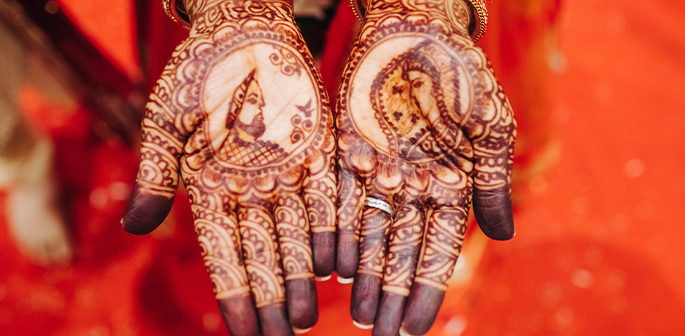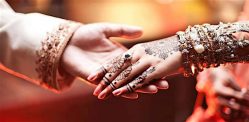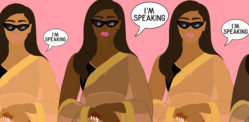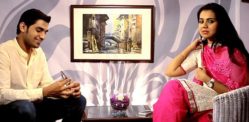"you can be a feminist in an arranged marriage!"
A young Desi woman who is fearless, hardworking, outspoken, an activist and a feminist, could make her an unlikely candidate for an arranged marriage.
So if a young Desi woman of this nature wants an arranged marriage, does this mean she is not a ‘real’ feminist?
First, let’s take a look at how feminism is defined. Many dictionaries define the term in their own way.
This includes ‘the advocacy of women’s rights on the basis of the equality of the sexes’, ‘the theory of the political, economic, and social equality of the sexes’, and ‘the belief that men and women should have equal rights and opportunities’.
Therefore, feminism basically stands for the equality of men and women but not being the ‘same’.
A point often argued is where men and women cannot be equal due to physical differences and capabilities.
But feminism does not look at the physicality but instead that ‘equal’ does not mean ‘same’.
The key takeaway here is the focus on equal rights and equal access to opportunities, something Desi women want more of, compared to the past.
There is now a growth in the movement towards equality and it is being witnessed even within the Desi community.
Hence, more and more Desi women now identify themselves as feminists, rallying in a fight against the inequalities that linger in the Desi community.
One topic that still raises questions is the tradition of arranged marriage, where historically, Desi women had no choice over their future.
However, arranged marriages have changed with the times and the influence of the western world.
Therefore, can a Desi woman who is a feminist have an arranged marriage? We take a look at why or why not.
History
What are the origins of arranged marriage, and why is it still such a customary practice in today’s modern society?
Rituals like dowry, arranged marriage and forced marriage have existed for thousands of years in many cultures.
Traditionally, there are many factors that families take into account when scouting for a potential spouse for their daughter. These include:
- Caste
- Profession
- Family reputation
- Religion
Conventionally, parents must be involved in every step of the matchmaking process.
The parents must analyse the desirability of the match.
From the initial discussion between households, dowry negotiations, to the introduction of their children, and the wedding plans.
Do Arranged Marriages Work?
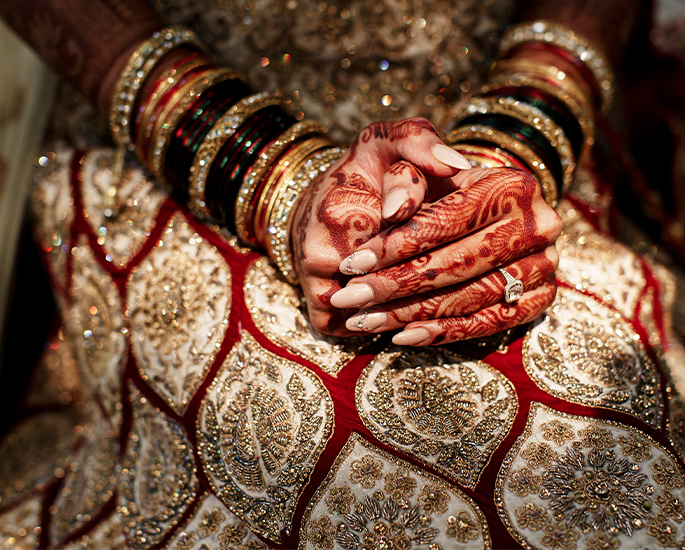
For many, this custom might appear invasive, but this is the reality for millions of young people.
Arranged marriages can also be viewed as an immigration strategy, giving a once in a lifetime opportunity to a young woman to explore a new world.
Where she can work and thrive with her new partner, socially and economically.
To some, arranged marriages might appear to be a caring and considering ritual.
Since two doting parents are eager to find the perfect spouse for their child. A unification of two loving, respected families.
Arguably, this past procedure focused on the social and economic benefits of this union.
This is despite the feelings and opinions of the two who are marrying.
Hence, there are often negative connotations that surround the topic of arranged marriages.
However, this carefully constructed ritual is proven to work as it has created countless happy, loving marriages.
This can be justified by the low divorce rates in India.
On the contrary, the low divorce rate can owe up to societal pressure, as the stigma surrounding divorce is still very present.
If someone were to ask for a divorce, they will be most likely shamed for going against the rules of their parents and culture.
As a result, it proves the system has failed.
Forced Marriage vs Arranged Marriage
Arranged marriages and forced marriages are not the same.
In an arranged marriage, a woman should have a choice, and they should voice their opinion.
The UK Government defines forced marriage as:
“Where one or both people do not or cannot consent to the marriage, and pressure or abuse, is used to force them into marriage.”
However, being forced into a marriage does not need to be physical, as it can also be emotional manipulation.
Therefore, parental pressure and emotional guilt can push a woman into an agreement.
Arguably, in many cultures, the custom of asking for a woman’s consent is a foreign concept.
The present inequality for women has led to many voicing their opinions on the arguably sexist agendas in an arranged marriage.
Feminism in the Desi Community
The inequality for Desi women has grown beyond marriage.
Discrimination is present in most areas of life, work, education and most sadly, love.
Deep-rooted gender stereotypes subconsciously reside in the minds of many. Men are the breadwinners, and women will take care of the children.
These patriarchal expectations have led women to protest, scream and shout until they have some sense of equal respect.
From this fight for equality, the term feminism was born. The definition of ‘feminism’ in the dictionary has multiple statements:
- The advocacy of women’s rights based on the equality of the sexes.
- The theory of the political, economic, and social equality of the sexes.
- The belief that men and women should have equal rights and opportunities.
However, now there are negative connotations and stereotypes that surround the term.
For example, feminists hate men. They hate the colour pink. Feminists do not want men to open the door for them.
They hate anything traditionally feminine, and the list goes on.
These peculiar assumptions come from a lack of understanding of what feminism is and why it is needed.
But feminism is simply seen as a synonym for equality.
Western Feminism vs Desi Feminism

When looking into the first wave of Western feminism, the suffragette movement stands out.
It fought for changes like voting rights, political participation, equal pay.
But it lacked inclusivity and the prioritisation of rights for women of colour.
Some western feminists still do not understand the role culture and religion play in most Desi women’s lives.
Most believe the role of a housewife is useless, and insinuate children should be raised by paid carers.
Some also support the misconception that all arranged marriages are abusive, eliminating choice and belittling Desi women.
Female western feminism has begun to follow this misogynistic narrative of equality.
Consequently why some men question western feminism, confusing this with women competing for masculinity.
“If you’re a feminist, then pick that heavy box up yourself.”
These expectations are simply impossible.
Generational Feminism & Privilege

Many young Desi women call themselves feminists. They actively protest and raise awareness of sexism in the Desi Community.
However, this fight did not begin with them.
This silent but empowering fight for equality began with their mothers, aunties, and grandmothers. It has been a generational battle.
Some older Desi women might not even know what the word feminism means.
However, they gave young Desi women a voice to scream, shout and command.
Most older Desi women had an arranged marriage, but this does not take away from their actions and strengths.
They ran the household, organised occasions, handled bills, and encouraged their daughters to work and do well at school.
The boss.
The matriarch.
They did it all without labelling themselves as feminists.
In some countries, being outspoken on feminism can lead to abuse.
Hence why having the choice to say out loud, “I am a feminist” is a privilege for many.
The Modern Arranged Marriage

In the past, Desi women did not have a voice in the matters of their arranged marriage.
However, now in India, arranged marriages are still relevant.
Moreover, ‘love marriages’, where there has been no initial influence from the parents, is now popular.
The Desi community is arguably now more open and understanding of a woman’s modern lifestyles.
For example, clubbing, drinking, and tattoos are more accepted now.
Not only has the social lives of young women developed, but so has the customs of arranged marriages.
Women now are more actively involved in the negotiations of arranged marriages.
For many now, it is no longer looked at as a pressured, life-changing decision but instead a real-life matchmaking service.
Rather than meeting their potential spouse in a pub or a club, parents will introduce a man, and they can date if they choose to.
They have the power to decide how their relationship unfolds.
There has also been a development in this matchmaking, with new and parent-approved dating sites.
These apps help singles and their families to search for prospective matches that meet their requirements.
Of course, there may still be a family influence, for example, parents must approve of the suitor and his family history.
But the woman will have the final say, and she decides what the next step will be.
Feminism in an Arranged Marriage
Thus, raising the ultimate question, can a woman be a feminist and have an arranged marriage?
Well, there is no yes or no answer to this complex question.
If the marriage is forced, through physical or emotional pressure, this defeats the purpose of feminism.
However, if a woman chooses to have an arranged marriage, that does not make her less of a feminist.
Many still believe that arranged marriages prohibit the freedom and independence of a woman.
But evidently and thankfully, this might not be the case for some.
Women who live in a more westernised world are privileged to have this choice.
A woman might want to leave the hassle of finding a suitable husband up to her parents, similarly to those who use a dating app.
Most importantly, the role and status of women in the sphere of arranged marriages have changed.
This change has been monumental for some.
Some women are now treated fairly and not as objects or subordinates to their husbands.
What Do Young Desi Feminists think?

DESIblitz sat down with two women who describe themselves as feminists to discuss whether they believe feminists can have an arranged marriage.
*Simran
*Simran, aged 23, describes herself as a “justice warrior”.
She strongly believes an arranged marriage is a gateway for abuse, which is why a woman should not call herself a feminist if she chooses this route.
“I think many people will agree with me when I say countless women suffer in arranged marriages.
“I have seen women in my life have an arranged marriage, and it has ended badly, and they called themselves feminists.
“But they still went through with the arranged marriage, even though they knew what the outcome could be.”
Despite being firm in her beliefs, Simran understands that not all women are privileged like her.
She explains:
“I completely understand that some women might be forced or manipulated.”
“Or they have just grown up in a country where they might not have freedom.
“But for women like me, we live in a western world, and we are listened to when we speak.
“We’re lucky to have a more privileged life, so why not use our voice to fight for what’s right, and that starts with preventing arranged marriages.”
Sharan
However, Sharan believes that women should support women regardless of how they choose to live their life.
“I feel like even amongst women, there is a lot of hatred towards women who want to take a traditional role.
“At the end of the day, if that is their choice, a feminist should support that.”
She thinks that people only see arranged marriages as bad, which can come from misconceptions.
“If arranged marriages are consensual, they can be a perfect choice for a feminist because the woman can choose which man she wants to marry.
“An arranged marriage is now completely shrouded in stereotypes. It is similar to feminism which has a lot of stereotypes too like women hating men.”
Sharan understands that people can have a negative experience in an arranged marriage, but she believes this can also happen in any marriage.
“For example, people say it is restricting, and of course, it might have been like that in the past.
“All an arranged marriage is changing is the way you might meet your partner. It does not take away a woman’s choice or right to say yes or no.
“So, of course you can be a feminist in an arranged marriage!”
Equality and Choice
Overall, many will still disagree with arranged marriages as sometimes there is an element of sexism that still exists.
Hence the need for feminism in the Desi community and society.
Feminism exists to combat the idea that a woman’s only purpose is to be a wife and a mother someday.
This is incredibly detrimental to a woman’s self-esteem and perception of her self-worth.
However, because of feminism and the strength of Desi women, arranged marriages have changed to where equality, respect and love are present in the marriage.
Moreover, if a woman wants to have an arranged marriage out of respect for her culture and traditions, she should not be shamed.
This comes from a lack of understanding of what feminism is and what arranged marriages are.
A woman can call herself a feminist, be passionate for equality and still watch a tear-jerking rom-com.
They can aspire to be the president, breaking down barriers. Or they can choose to be a housewife, caring for children.
It all about choice.
Women who are feminists, fight for women to have a choice, and a Desi woman should not be labelled an anti-feminist for choosing an arranged marriage.




















































